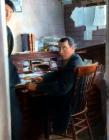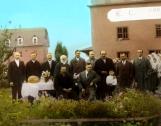1
Michael Kazakoff business manager at the CCUB office1911
Verigin, Saskatchewan, Canada
 Credits:
Credits:From the Autochrome Exhibit, Doukhobor Village Museum, Castlegar, BC
2
It would be nearly three years before Peter Petrovich would take leadership. In the interim, the business management of the CCUB, which could only be described as massive, was given to Michael Kazakoff and Joseph Shoukin, both experienced and knowledgeable in the business affairs (but lacking Peter Lordly's finesse).Respected members of the CCUB, Gabriel Vereschagen and Nicholai Plotnikov were sent to Russia to convince Peter Petrovich to come to Canada to take over the leadership of the CCUB.
In Russia, Peter Petrovich was willing but not aware of the division of the Doukhobors in Canada. He wanted to unite the Independents, Sons of Freedom and the Community Doukhobors. Vereschagen and Plotnikov returned to BC having partially fulfilled their goals. Peter Petrovich began a campaign from Russia to unite the factions - and to ask for money from the Doukhobors to help him with his journey.
Favourably for the Doukhobors, a shift in school truancy developed when from Russia. Peter Petrovich instructed his BC brethren to re-enroll their children in school - and this appeased provincial government officials. In a pattern that would be repeated, it is said that Peter Petrovich was able to raise about $18,000 for his trip to Canada from the three Doukhobor factions to help him in his journey (but the figure may in fact be less).
3
Until the arrival of Peter Petrovich, the CCUB had many business obstacles to deal with under the direction of Kazakoff and Shoukin. There were the truancy fines, taxes, building arsons to pay for, seizures by the province, and upon Peter Lordly's death there were a few short-term loans that would be called, simply on the lack of confidence in the CCUB as a result of his demise.4
Financially speaking, the CCUB was on very shaky ground once their leader wasn't there to guide the operations. In the interim, a new loan of $350,000 was taken out with the National Trust Company to pay these mounting expenses using all of the CCUB's land and buildings, including the Brilliant jam factory as collateral - something that was never done in Peter Lordly's time. When Peter Petrovich arrived in 1927, the CCUB was in debt for over a million dollars and no credit left because all assets were mortgaged.6
Peter Petrovich took a little longer to get to Canada than originally expected after his meeting with Vereschagen and Plotnikov, and though his mother arrived before him, reached his destination in Brilliant, BC in October 1927 as the heir to the leadership of the CCUB.Chistiakov - the Purger; the name he had given himself by which he was subsequently known, immediately embarked on a mission to rid the CCUB of the considerable debt it had acquired in absence of a leader.
8
The changes in the business of the community were not the only changes that the community itself immediately noticed between the new leader and his revered father. Rumours of Peter P. Verigin's lifestyle and habits spread, and although many first-hand witnesses had attested to Peter's penchant for alcohol, gambling, and temper tantrums, there was certainly more to him than that; evidence of his shrewd business practices also became apparent as he made significant improvements to the state of community holdings.From a business standpoint (and from both the provincial and federal point of view) his mission and promise of change seemed promising. Immediately upon arriving he assured the authorities that children would attend school. (Somehow, some followers, mostly the more radical Sons of Freedom members within the community, would interpret his instructions as opposite to what he would state. If the leader promised that children would attend school, they reasoned that he really meant they would not). And while Chistiakov built new schools under his leadership, truancy (and arson of these schools) also rose.
But from within the community, Chistiakov's changes in the structure of the business of the community were an abrupt and a distinct change from the past. The community would no longer ?look after' its members and in essence, would now charge a fee to belong to the community. Without going into great depths of the workings of this arrangement, it meant basically, that the collective income of the community would not be divided and re-distributed (while looking after the basic needs of the community members), but that the workers were able to now able to earn their own wages and pay a fee from the surplus, back to the CCUB.
9
Doukhobors improve their holdingsCirca 1910
Brilliant, BC, Canada
 Credits:
Credits:Photo by Hughes Bros. Studio, Trail, BC
From the Autochrome Exhibit, Doukhobor Village Museum, Castlegar, BC
10
The changes in how the community would be run would have a profound effect on the community members. In the case of agriculture for example, the members would no longer farm or harvest their orchards and give the produce back to the community. Now, they would be able to sell the produce to the CCUB, and profit from the proceeds - and in return, pay a fee to the community to live and harvest on the community lands. Many of the elders and ?old believers' were most dissatisfied with this arrangement based on their traditional beliefs that the handling of money was a transgression of the basic Doukhobor communal principles. Furthermore, this new method was undermining the basic principals formed by his father, Peter ?Lordly' which disgruntled his father's dedicated followers.Those that argued, or didn't agree with the new ways of the communal business didn't have a voice. (This was not the communal way of the past where the majority in essence could openly state their opinions). Those who were openly discontent were simply banished from the community - ousted from their homes. Many of the community members were sympathetic towards their brethren who refused Chistiakov's hard-line approach.
Aside from the growing discontent of the ?old believers' (some who joined the ranks of the Sons of Freedom), Chistiakov's problems grew continually with both the lack of finances due to the depression, and the growing discontent from the government officials. The community was not immune to the depression; although somewhat isolated from the outside world, the community had business interests which suffered from the depression. Lumber purchases, preservatives, produce, and other income dwindled in the depression thus hurting the community's income. And with growing governmental pressures, (like his father before him) he explored other locales of possible Doukhobor habitation. It seemed to the most of the Doukhobors that the federal and provincial governments would continue pressure and persecution. With an eager following, Peter explored both returning to Russia, and Mexico as possible re-locations.
However, the provincial government's perspective was becoming both impatient - and embarrassed. Not only was truancy up in Doukhobor enrollment (contrary to Chistiakov's promises), but the discontented (Sons of Freedom) were growing in numbers, as were their demonstrations. Chistiakov's questionable behaviour no doubt added to the concerns of the government - and creditors.
12
With the government now in effect as a landlord, and an uncertain future, many Doukhobors, left the villages - perhaps a chance (albeit forced) to become independent - to assimilate - which is what the government openly had preferred for the last two decades. Some stayed on in the villages for decades, but not in a communal fashion as before, but as tenants.Discrepancies occurred to the properties that were once communal and prized. The ?heart' of the community had been broken in more ways than one and the dismantling of many enterprises through receivership prevented thousands of Doukhobors from earning a living. Assimilation was no longer a choice but a necessity. Community land holdings in Saskatchewan were sold and many of the community Doukhobors there managed to purchase them.
On February 11th 1939, Peter Petrovich Verigin 'Chistiakov' died in a Saskatoon hospital. He was buried at his father's tomb in Brilliant, BC overlooking the vast and once-prosperous lands of the valley below.
The jam factory operated under the management of the Lands Settlement Board. In December 1943, two majors in full military dress appeared at the jam factory to persuade Doukhobors to comply with national registration - and join the war effort. The Doukhobors presented a petition 4000 strong objecting (as was their right by 'conscientious objector status'). Early next morning, the KC Preservatives Works worth $400,000 at that time, was destroyed by fire - the culprits never found.
13
Conclusion:It was in essence the end of an era; it was clear that the Doukhobors would never be allowed to live communally again in BC as they did under the umbrella of the CCUB. The devout and devoted Community Doukhobors formed the Union of Spiritual Communities of Christ under the leadership of Peter Petrovich Verigin in 1938, and after his death, young grandson, John J. Verigin became the secretary of the USCC in 1940.
A spiritual reincarnation of its predecessor, the USCC forms the nucleus of the majority of CCUB descendants today. Assimilation has made this group of Doukhobors (as with others) a part of the great Canadian mosaic and the today, the USCC is primarily a spiritual-based entity rather than any sort of enterprise in the sense that was the CCUB.
While some have blamed the collapse of the CCUB entirely on Peter Petrovich Verigin or ?Chistiakov - the Purger', its clear that while his behaviour was, both internal and external forces were at work well before and during his tenure as leader to undermine the largest communal enterprise in North America. Under his leadership though, he did reduce the debt of the community from over one and a quarter million dollars by over $700,000 and was responsible for paying over half a million dollars in interest and over $300,000 in taxes.
* Both Peter ?Lordly' Verigin and son Peter ?Chistiakov' Verigin, were powerful personalities - each fascinating in their own distinct way. The life and times of each could fill volumes; hence this brief sketch of their role in history represents only a glimpse of the total picture.

